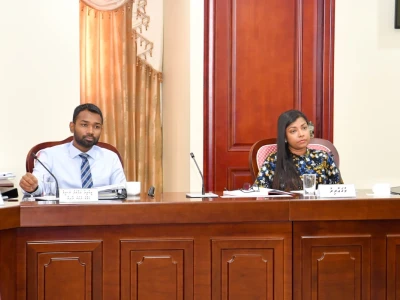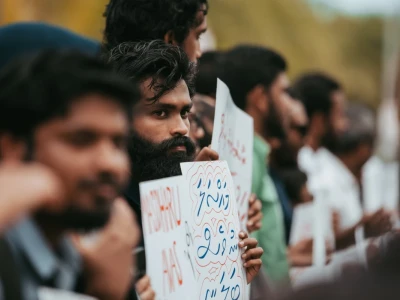
Committee approves HC's sole authority for source disclosure order
In application to the High Court, the Prosecutor General is required to present to the court the reasons and relevant evidence first.
Top Stories
By
Mariyam Umna Ismail
Parliament's judiciary committee has decided to amend the Evidence Act to make it mandatory for journalists to disclose their sources on the basis of a High Court order only.
When the parliament passed the Evidence Bill, designed to force journalists to disclose their sources, and ratified by President Ibrahim Mohamed Solih on July 18, journalists went out on a stretch to express their concerns, as protecting their news sources were vital to the functioning of the media.
As per the law:
-
On the basis of a complaint filed by a person involved in a case, the court may make it mandatory for the journalist or the media agency to disclose sources; the act does not specify a court
-
It does not explicitly specify the circumstances under which national security is threatened and what constitutes acts of terrorism
-
Maldives Journalists Association (MJA) and Maldives Media Council (MMC) have called for the removal of Section 136 of the Bill as it poses a challenge to journalists and whistleblowers
To address these concerns, Gan MP Mohamed Visam, on behalf of the government, introduced a bill to amend the Evidence Act in November. As suggested by the government, the committee also decided to give only the high court the power to direct source disclosure. This is in accordance with a proposal made by the prosecutor. Thus:
-
Section 136(c) of the Evidence Act states that while deciding whether it is proved on a civil basis, the trial court must take into account matters relating to the petitioner's application seeking direction to disclose the contents of the journalist.
-
The provision allows the defendant or the accused to apply for the disclosure of the source. Therefore, the committee decided to amend the provision to make it clear that such a case can be brought to the court only through the prosecutor general and that such a case can be filed only in the high court.
In application to the High Court, the Prosecutor General is required to present to the court the reasons and relevant evidence as there appears to be a situation in which a journalist is compelled to disclose information that would indicate who an informant was.
On the basis of this submission, the high court can direct the journalist to disclose his source only if, according to the bill, the court is burdened with the public interest in disclosing the information. Here are the things that the High Court needs to take into account while passing such an order:
-
1-
If someone is committing or attempting to commit an offence involving terrorism or an act prejudicial to national security.
-
2-
Knowledge of the information is directly relevant to the charge sheet relating to the trial in the lower court and is necessary for the charge sheet.
-
3-
The extent to which disclosure of this information is likely to lead to a non-fair judgment against the defendant in the lower court.
-
4-
The magnitude of the harm the disclosure of who the person is, that provided information to the journalist may cause to the source or the impact it may have on someone else.
-
5-
If there is no other way except to reveal the source; unable to know information without mediating the journalist or where they work or any other factors.
-
6-
The extent to which the public interest is harmed in causing disclosure of news sources and hindering the news process, may be undermined.
The court has to decide on such a proposal within a maximum of 14 days.
It also provides for the definition of "an offence involving an act prejudicial to national security" in the act. According to the bill, it is a cognizable offence involving unlawful activities and other acts of endangering the sovereignty or integrity of the country and any other similar offence as defined in any other law.




